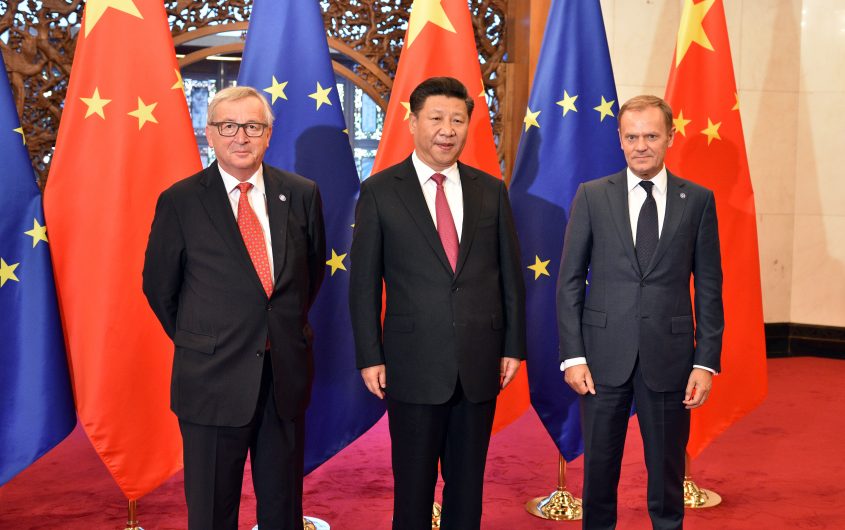
European External Action Service via Flickr
Transatlantic Responses to the “China Challenge,” and the Changing Dynamics of Global Development

Isabella Mekker
Research Intern
Isabella Mekker was a research intern at AICGS for the spring of 2019. She writes articles for the AICGS website, conducts research for current projects and resident fellows, manages databases, operates the front desk, and helps to organize and document events.
Ms. Mekker is currently pursuing a Master’s degree in International Affairs at George Washington University’s Elliott School of International Affairs, with a focus on International Security and Global Gender Policy. Her current research interests focus on security and development policy, the European Union, and the role of China in the future of international affairs.
Prior to pursuing her Master’s degree, Isabella received a Bachelor’s degree in Political Science from Clark University. Isabella has spent time living in Beijing, China, where she was a student for four years and an intern at a healthcare nonprofit for several months. She has also lived and studied German in both Vienna and Munich.
The past decade has been distinguished by the looming question of the “China Challenge,” which has often been characterized as the biggest threat to the liberal world order and democracy since the Soviet Union during the Cold War. China has quickly become the fastest-developing country in global history, lifting hundreds of millions of its citizens from poverty. With that being said, its rapid succession from a developing country to one which seeks to be a major influencer in the process of development has been a rude awakening for the transatlantic countries that have for so long dictated its path.
The growing number of development agencies with major Chinese stakes are just one example of the scope of this challenge. China has become a major player in South-to-South Cooperation projects, exemplifying a model of a country that has excelled without following traditional Western policies for development. Traditional models of development were premised on the foundations of liberal democratic norms, led primarily by the United States, the European Union, and transatlantic institutions. This process of achieving development goals ended up creating a disconnect between national/local development and the global requirements for aid based on the bars that the U.S., EU, and economic institutions have set. Nevertheless, the nature of the world economy has changed since the creation of these institutions, and so, too, has international development. The “China Model” has consequently become a flagship case for many of these countries who are now looking to the East as an example.
Both the Asian Infrastructure and Investment Bank (AIIB) and the New Development Bank (NDB) are headquartered in China and follow the principles that China has unveiled as their priorities for development projects. This largely entails a greater focus on building new, sustainable infrastructure without political expectations for the development process. Realistically, however, Chinese development aid is not separate from politics. While it might avoid the notion of instituting democratic reforms as a precursor to providing aid, the first condition for receiving aid is the recognition of the One China policy, which is hardly separate from foreign policy.
The Belt and Road Initiative (BRI), which has gained an enormous amount of publicity in the last year, is one of the major projects initiated by the AIIB, seeking to connect the Asian and European continents through a series of infrastructure projects. This is important, as the World Bank has stated, because if successful, the BRI would have the power to completely transform the economies of the region as well as relationships in the global economy. This initiative will provide a trade route linking Germany to China in a more efficient way than ever before—presenting a pivotal moment for the direction of transatlantic relations. The United States has remained critical of the BRI but nevertheless Central and Eastern European countries who recently have begun to clash with Western Europe, have also begun to look East toward Chinese investment. With China as a leader of this project the question becomes not if, but how they plan to intertwine policy influence into the mix of these initiatives.
Where Do We Go from Here?
In a rapidly changing world the context of development has changed significantly. However, the institutions that were once created to maintain the liberal world order have prided themselves on tradition and as such, new institutions are filling the gaps. The transatlantic community needs to shift the rhetoric away from looking inward and rather look to developing countries to find what development solutions work for them. The question becomes, how can we include countries like China, while still maintaining the same core values?
The transatlantic community needs to shift the rhetoric away from looking inward and rather look to developing countries to find what development solutions work for them.
One thing is clear: we need a strong transatlantic relationship for a collective voice in dealing with the challenge. Cooperation between Germany and the United States is the only way to create new solutions and reforms to secure the liberal world order. Regarding development, Germany and the United States are finding this difficult to achieve. In the last month, the Trump administration announced plans to cut U.S. aid to Guatemala, Honduras, and El Salvador in the midst of a migrant crisis on the southern border. While the U.S. continues to cut aid to developing countries globally, China is on its way to forming a new global network of interdependence through Chinese aid.
U.S. and German development agencies should be strengthening their projects globally by looking to develop new and innovative solutions to global challenges, rather than suspending them. Germany and the United States should be working together to reform institutions such as the WTO, IMF, and World Bank to fit the new challenges and players that define our global interactions. While the Trump administration has made it difficult to cooperate, for the benefit of maintaining the liberal world order Germany needs to play a strategic role in maintaining a strong transatlantic relationship. We need to define China as an active player in international affairs, one whose influence and power is not growing but already in action.







